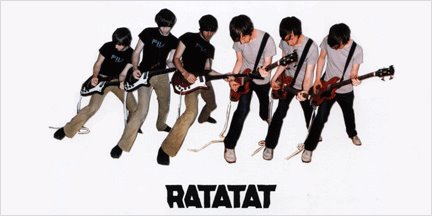
“Seventeen Years”
from the album Ratatat
2004
iTunes
Download a free MP3 of “Seventeen Years” via the band’s website
[right-click/save-as]
Further blurring the boundaries between electronic music and rock, Ratatat’s self-titled debut album mixes Evan Mast’s fractured but propulsive beats and woozy analog synths with Mike Stroud’s loud, yet somehow subtle, guitars. Come to think of it, “loud yet subtle” neatly sums up the instrumental duo’s approach — while their sound can pack a formidable punch, it’s also atmospheric. Often, the duo is both aggressive and atmospheric within one song, as on the album’s opening track, “Seventeen Years”: It begins as a dancefloor stormer, with in-the-red guitars and keyboards and a beat that sounds like it’s gasping for air, until an analog synth-driven breakdown turns it into something more moody and bedroom-bound. More laid-back than dance-punk but livelier than post-rock, Ratatat’s shuffling rhythms and pensive keyboards clearly owe a debt to Mast’s work as E*vax, but other influences pop up too. Comparisons have been made to Daft Punk, and for the most part, they’re justified; with its busy guitars, much of Ratatat plays like an indie spin on “Aerodynamic” from Daft Punk’s Discovery, albeit with a slightly less arch feel. The bittersweet naïveté that floats through the album also recalls a more roughed-up version of Plone’s nursery rhyme electronica, particularly on “Cherry,” the sleepy epic that closes Ratatat and pays tribute to the band’s former name. A slight hip-hop vibe also pops up from time to time, most clearly on “Crips”‘ insistent bass and rattling beat, but also in the spoken word interludes that dot the album.
 Ratatat |
Often, Ratatat’s music is deceptively simple; in particular, Mast’s beats are more interesting and intricate than they sound at first. They sound uniquely live, but their clicking, stuttering rhythms are definitely electronic and would be difficult, if not impossible, for a live drummer to produce. “Everest” features a particularly well-crafted beat that pops in and out of the guitar’n’synth mayhem atop it, making the song (and the rest of the album, for that matter) good for close listening as well as background music. Songs like “Desert Eagle,” “Lapland,” and “Breaking Away” sound oddly cheerful and melancholy at the same time, and help create a consistent mood on Ratatat — a mood that may be too consistent over the course of a full-length album. Individually, each song on the album sounds fantastic, and each song is crafted for maximum tension and release. But, as winning as the group’s formula is, there isn’t much variation in it, which detracts from the album as a whole. A few songs break the mold a bit: “Bustelo” adds elements of new wave and soul, “Spanish Armada” has some hints of aptly Spanish-sounding guitar, and “Germany to Germany” has some rounded synths that recall German brass, not to mention rousing guitars that are enough to induce a Big Country flashback. But just because Ratatat sounds a little samey doesn’t mean that the album isn’t good; it is. The band’s sound is both fresh and nostalgic, and so pretty that it seems overly harsh to criticize them too much at this point. It’s just that Ratatat is good enough to suggest that, with a little more diversity, the group could do even better things.


